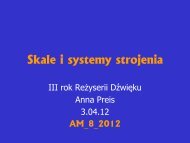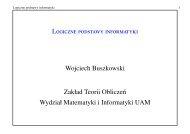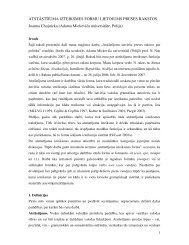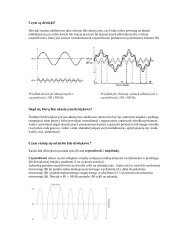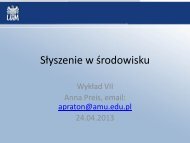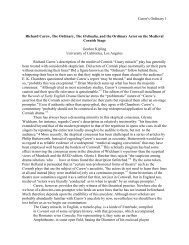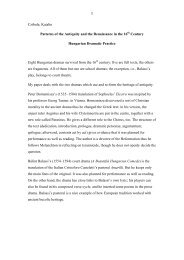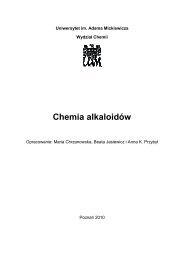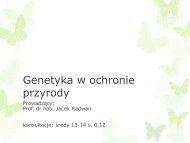Amir Weiner Getting to Know You
Amir Weiner Getting to Know You
Amir Weiner Getting to Know You
You also want an ePaper? Increase the reach of your titles
YUMPU automatically turns print PDFs into web optimized ePapers that Google loves.
GETTING TO KNOW YOU 37<br />
rule, combined with the decisive defeat of the armed guerrillas, produced a<br />
surrealistic rosy picture of the popular mood in the region.<br />
Hence, when a rare alignment of succession struggle and institutional<br />
rivalries inadvertently turned a public debate over the role of the Communist<br />
Party in managing the economy in<strong>to</strong> a threat <strong>to</strong> the political and terri<strong>to</strong>rial<br />
integrity of the Soviet Union, the surveillance agencies were able only<br />
<strong>to</strong> analyze ex post fac<strong>to</strong> rather than anticipating the crisis. Throughout<br />
the spring and summer of 1953, the western republics were seized by<br />
unprecedented excitement when locals from Es<strong>to</strong>nia <strong>to</strong> Moldavia interpreted<br />
the simultaneous initiatives <strong>to</strong> reorganize the administrative division of the<br />
republics, <strong>to</strong> accelerate the indigenization of local cadres, and <strong>to</strong> reach out<br />
<strong>to</strong> prominent figures of “bourgeois-nationalist” background as inseparable<br />
and decisive steps in the dissolution of the union. The regime confronted<br />
the popular identification of (Russian) ethnicity and (communist) political<br />
affiliation and the conflation of reforms with <strong>to</strong>tal collapse. Multiple reports<br />
recorded indigenous populations publicly talking about secession from the<br />
Soviet Union, de-Russification of the Baltic republics and western Ukraine,<br />
and abolition of the single-party dicta<strong>to</strong>rship and the collective farms, and<br />
demanding the res<strong>to</strong>ration of indigenous languages as the lingua franca<br />
in state institutions. 102 Scores of local party members and members of the<br />
Soviet intelligentsia were identified as instiga<strong>to</strong>rs of the unrest, forcing the<br />
leader of the Lithuanian Communist Party, which emerged as an especially<br />
troublesome case, <strong>to</strong> offer an unusual public assurance that the “Communists<br />
of Lithuania will remain loyal <strong>to</strong> the Central Committee of our party.” 103<br />
The difficulty of extracting information from and about politically restless<br />
cohorts was underscored again barely three years later with waves of amnesties<br />
underway. The KGB and MVD were on the mark in warning the authorities<br />
about the dangers of allowing released nationalist guerrillas and activists back<br />
<strong>to</strong> the borderlands. Yet their repeated warnings went unheeded, resulting<br />
temporarily in a near paralysis of public life, especially in the countryside,<br />
when the unrest in Poland and Hungary in 1956 spilled over in<strong>to</strong> the western<br />
102 On the unrest in the western frontier in the spring and summer of 1953, see <strong>Amir</strong><br />
<strong>Weiner</strong>, “Robust Revolution <strong>to</strong> Retiring Revolution: The Life Cycle of the Soviet Revolution,<br />
1945–1968,” Slavonic and East European Review 86, 2 (2008): 213–22. On plans <strong>to</strong> reach<br />
out <strong>to</strong> “former people,” see Tonu Tannberg, “Novyi kurs L. Berii po podavleniiu dvizheniia<br />
soprotivleniia v Baltii i v zapadnoi Ukraine vesnoi 1953 goda,” in his Politika Moskvy v<br />
respublikakh Baltii v poslevoennye gody, 1944–1956 (Tartu: Tartu University Press, 2008),<br />
78–106; and Dmitrii Vedeneev and Iurii Shapoval, “Byl li Lavrentii Beriia ukrainskim<br />
natsionalis<strong>to</strong>m,” Zerkalo nedeli, 13 July 2001.<br />
103 Lavrentii Beriia, 1953: Stenogramma iiul´skogo plenuma TsK KPSS i drugie dokumenty<br />
(Moscow: Mezhdunarodnyi fond “Demokratiia,” 1999), 91, 148–53.



